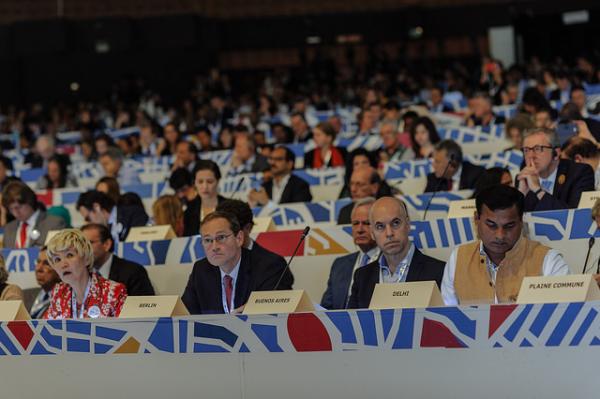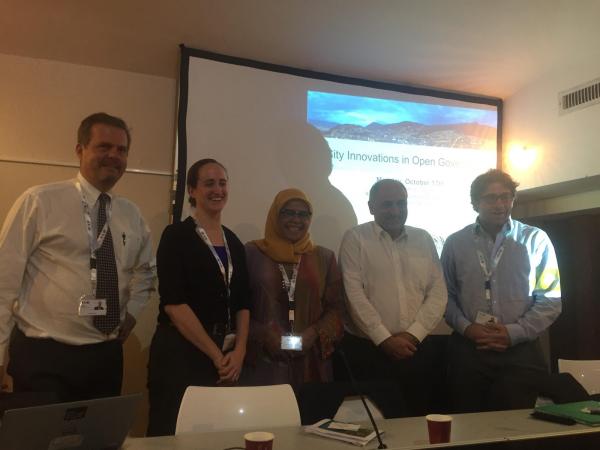Historic Adoption of the New Urban Agenda Highlights Opportunity for Subnational Actors and Open Government
In October, in Quito, Ecuador, the world’s countries, local governments, and the urban development community came together to adopt the Habitat III New Urban Agenda, a global commitment to sustainable urbanization that will guide the urban future for the next two decades. Habitat III, the bi-decennial United Nations Conference on Housing and Urban Development, renewed the dedication of many to create more inclusive and sustainable urban areas where, as of 2014, more than half of the world’s population live. Key in the adoption of this New Urban Agenda is the recognition of the essential role of certain actors – particularly subnational governments and citizens – in the implementation and success of sustainable urban development. As such, the Open Government Partnership, along with our subnational pioneers and the current civil society co-chair, World Resources Institute (WRI), worked to elevate the role of subnational governments and citizens within the New Urban Agenda and during Habitat III.
Created through months of debates, negotiations, and collaboration between diplomats, technical experts, grassroots communities, academia, and non-governmental stakeholders, Habitat III stands out as a global commitment to the role of citizens and community in the creation of urban environments. The New Urban Agenda proclaims that: “[w]e envisage cities and human settlements that…are participatory, promote civic engagement, [and] engender a sense of belonging and ownership among all their inhabitants” (paragraph 13a), in alignment with the vision of open government, where governments are more open, accountable, and responsive to their citizens. Several OGP subnational pioneers, along with WRI and the OGP Support UnitThe OGP Support Unit is a small, permanent group of staff that work closely with the Steering Committee and the Independent Reporting Mechanism to advance the goals of the Open Government Partnership...., worked to make the linkages between open government and sustainable urban development through activities at Habitat III as well as commentary provided throughout the creation process of the New Urban Agenda.
In particular, representatives from OGP subnational pioneers from Buenos Aires, Argentina and Paris, France, among others, formed a panel to discuss “City Innovations in Open Government”, highlighting open government innovations such as gender-responsive and vulnerable population-responsive participatory budgeting, smart monitoring systems, mobile City Halls, and open procurement platforms. Innovations such as these are called for in the New Urban Agenda, which is “rooted in new forms of direct partnership between governments at all levels and civil society, including through broad-based and well-resourced permanent mechanisms and platforms for cooperation and consultation open to all” (Paragraph 92). Open government can build trust between citizens and governments and to create more responsive subnational governments and will be key in implementing an inclusive urban future under the New Urban Agenda. Important takeaways from the event, which was moderated by WRI’s Global Director for Governance, Mark Robinson, include:
- A recognition of a fundamental shift in relations between citizens and state,
- The need to emphasize genuine civic engagement, not just transparencyAccording to OGP’s Articles of Governance, transparency occurs when “government-held information (including on activities and decisions) is open, comprehensive, timely, freely available to the pub... More and participation,
- The need to both include “old means” of engagement but also harness new technology to achieve participation, and
- The importance of linking innovations to outcomes that affect people’s lives.
The effect of the New Urban Agenda will most notably be felt at the subnational level, where citizens and governments are closer and many global agendas, such as the Sustainable Development Goals and the Paris Agreement on Climate Change, place the burden of implementation on subnational actors, particularly local governments. It is at the subnational level where the opportunity for success and transformation is greatest, whether in open government or in urban development. Recognition of this vital role is why the Open Government Partnership is working with fifteen pioneer subnational governments to develop a means for open engagement at the local level. While the New Urban Agenda recognizes the “equally important contributions of subnational and local governments…in a transparent and accountable manner” (Paragraph 15b), the negotiations and agreement ultimately rest on the leadership of national-level representatives. However, throughout Habitat III, local governments made sure their voices were heard, as OGP subnational pioneer representatives from Seoul, South Korea, Tbilisi, Georgia, and Madrid, Spain presented their cases for citizen-led city visioning and inclusive and transparent city development, among other topics, in a variety of events at Habitat III.
Habitat III was an opportunity for subnational governments to step forward to take ownership of a global agreement, the New Urban Agenda. With this increased role, there should be adequate autonomy, recognition, and resources for those subnational actors, both governments and civil society, who are essential to our global urban future, where by 2050, 66 percent of the world will be urban citizens (NPR). The New Urban Agenda firmly recognizes the centrality of cities and subnational governments and elevates the role of citizens in the global pursuit of sustainable urban development. Ban Ki-moon, the UN Secretary General, states that “mayors, governors, and councillors are at the forefront of the battle for sustainable development” (UCLG) and that success rests on their ability to implement and transform citizen’s lives for the better. The Open Government Partnership recognizes a similar role for subnational governments in the pursuit for more responsive, accountable, and inclusive government. At the OGP Summit, in Paris France, the fifteen subnational government pioneers will have established transformative commitments dedicated to more open government where the rubber hits the road, at the local level.
Left to Right – Mark Robinson (WRI, Moderator), Brittany Giroux Lane (OGP, Organizer), Maimunah Moh’d Sharif (President, Municipal Council, Seberang Perai, Malaysia), Jean-Louis Missika (Deputy Mayor of Urban Planning, Paris, France), and Fernando Straface (General Secretary and International Relations, Buenos Aires, Argentina)


